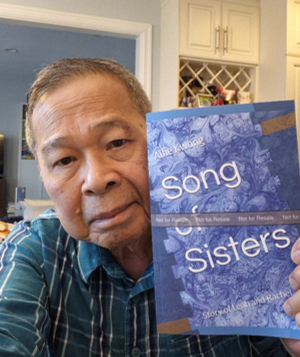Arts & Lifestyle
A New Passage: Brod Alfie Kwong's Latest Book "The Song of Sisters"

My second book, The Song of Sisters, is now listed in Amazon (various regions: US, Canada, Singapore, New Zealand, Europe, Australia, etc.) with the hard cover primarily available on Amazon, pricing: US$20 for hard cover, US$15 soft cover, US$3 for Kindle.
Fellow Edwin O. Paña wrote an in-depth critical review of the book in the Appendix section, and I excerpt:
……"The Song of Sisters" is a testament to the enduring power of the biblical narrative and its relevance to contemporary issues of gender, family, and identity. Kwong's modernist retelling breathes new life into these ancient figures, inviting readers to empathize with their struggles and celebrate their resilience. The poem's exploration of the complexities of sisterhood, the burden of motherhood, and the enduring legacy of patriarchal structures resonates with readers across cultures and generations."
“While the poem's free verse form may not appeal to all readers, its raw emotional power and insightful commentary on timeless themes make it a valuable addition to the literary landscape. Kwong's unique voice and fresh perspective on this ancient story offer a compelling and thought-provoking reading experience.)"
This short article hopefully articulates the motivation and short background in the book’s creation. Thank you, Brod Ricky Rionda for including this in the Upsilon Sun.
Shortly after the publication of my first book, a collection of poems I titled Controlled Burns, in the summer of 2023, I began gathering ideas about my next book project. As I consider myself a classicist “enthusiast” (and always imagined that my career as a Chartered Accountant was only a habit I indulged in to mask my true passion – as a poet and writer), I am drawn to studying Homer (and his more modern versions), Milton, Pope, etc., yet feel inadequate without having endured the actual accomplishment of a college degree or concentration in literature. So, even as an amateur, I would think any attempt to write in their genre would be worthwhile and thus “respectable.” At any rate, my retelling of an otherwise ancient narrative of two contending sisters would not attract a large audience, nor would my stab in the use of a modernist free verse poetic device be widely acceptable in the literary circles. Nevertheless, my desire is to write what I like and what my heart provokes. Yes, the final product will be an “acquired taste” morsel. I am hopeful though that there is enough enthusiasts out there that would appreciate my endeavour. Besides, there isn’t too much of a financial sacrifice – I mean, $20 for a hard cover or $15 for a soft-cover – you’d blow it on a simple vintage of California Red.
And I hope that my fraternity brothers, especially the many who enjoyed reading my first book, would support me in this perhaps “risky” literary effort. Who knows, the “acquired taste” might turn out to be a pleasant surprise – a dessert paying homage to a satisfying meal? Afterall, the tome is written from the honest heart of an upright tried and true fellow.
I wrote a lengthy background note in the Appendix clarifying how my new passage into biblical territory began. So, I will end with a passage from it:
The Book of Genesis is replete with stories of sibling rivalry. Almost right after the expulsion from Eden, Cain, son of Adam and Eve, took to murdering his brother Abel just because God favored Abel’s idea of an acceptable sacrifice (Animal vs. Plant). Here we have an almost strong temptation to ascribe this barbarous behavior to God’s favoritism (i.e. parental preference). This parental idea of favouring one offspring over another extends over generations – case in point, Isaac and Ishmael, Esau and Jacob, Joseph’s brothers vs. Joseph (Joseph’s brother’s jealousy prompted them to sell Joseph into slavery). Later, David’s sons fought one another over who was to be king.
In Leah and Rachel’s case, did this sibling jealousy occur way before their desire to reproduce, that is, from childhood? Here, the idea of “striving for significance” occupies center stage. In that world of patriarchal absolutism, a woman’s worth is measured by how well she can bear children. Laban, who is a no-good father model, perhaps raised them up in that kind of gender expectation. In my treatment of this rivalry, in their striving, they are almost like certain insects in the wild willing to die for the privilege of populating the world (an instinctual response), albeit I see this motivation as their act of producing a new nation. One wonders how much Jacob helped in creating family harmony. In the story, Jacob seems merely the prime inseminator, whose function is the possessor of the needed genetic material.
However, he never mistreated Leah nor the servant girls. In fact, he treated Leah and Rachel fairly and equally. While the Bible says he “loved Rachel even more than Leah,” this does not mean he hated Leah – only that he has a deeper and natural connection with Rachel, believing that their match to be divinely ordained from the start.Besides, Jacob comes to understand Leah’s role as one of his partners in God’s plan….
Hopefully, that’s enough frosting to whet your appetite.
To order on Amazon, please click the link below:
About the Author

Alfie Kwong '67
Alfredo "Alfie" Chu Kwong '67, retired Chartered Accountant, has been residing in British Columbia, Canada since 1971. His recently published book (available in Amazon), Controlled Burn: Collection of Poems is in high demand among Brods and Sis. His essays have appeared in the Upsilon Anthology, Living the Credo, Traditions, Atin Ito News among others.


